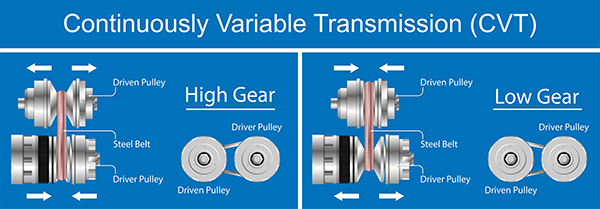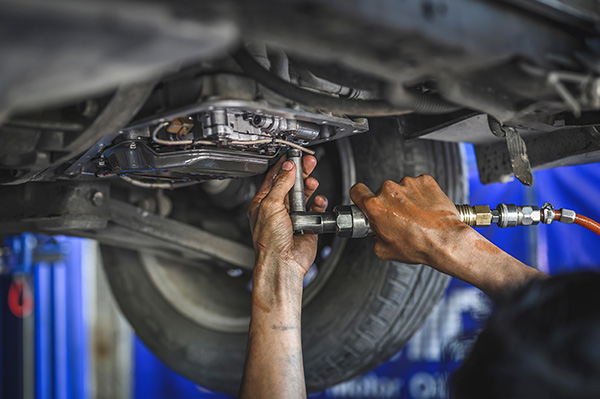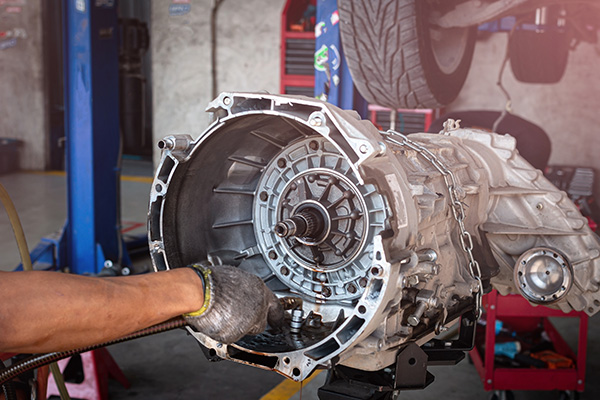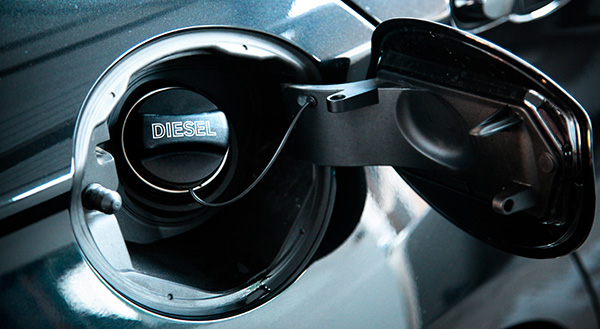Posted on 9/27/2024

When it comes to car transmissions, most people are familiar with the traditional automatic or manual options. But there's another type of transmission that’s becoming increasingly popular: the Continuously Variable Transmission, or CVT. If you've ever driven a car with a CVT, you might have noticed that it feels a bit different from what you're used to. But how exactly does a CVT transmission work, and what sets it apart from the other types? What Is a CVT Transmission? A Continuously Variable Transmission is a type of automatic transmission that doesn’t rely on a fixed set of gears. Unlike a conventional transmission that shifts between a specific number of gear ratios, a CVT seamlessly transitions through an infinite range of ratios. This unique ability allows the engine to operate at its most efficient RPM for a given speed, which can lead to better fuel efficiency and a smoother driving experience. The CVT's design is deceptively sim ... read more
Posted on 8/30/2024

Have you ever wondered when you should change your transmission fluid? It's a common question that many car owners grapple with. The transmission is one of the most critical components of your vehicle, ensuring that power from the engine is effectively transferred to the wheels. However, proper maintenance is required to function optimally. Ignoring the state of your transmission fluid can lead to serious issues down the line. These are the signs and guidelines for changing your transmission fluid to keep your car running. Why Transmission Fluid Matters Transmission fluid lubricates the moving parts, cools the transmission, and helps ensure smooth gear shifts. Over time, however, this fluid can degrade due to heat, friction, and contamination from metal particles. As the fluid deteriorates, it loses its ability to perform these critical functions, leading to pote ... read more
Posted on 7/26/2024

Automatic transmission shaking and vibrations can be alarming and uncomfortable for drivers. These symptoms often indicate underlying issues that, if left unaddressed, can lead to more serious and costly repairs. Understanding these problems' potential causes can help you promptly identify and address them. We will explore the common reasons behind automatic transmission shaking and vibrations and what you can do to fix them. 1. Worn Transmission Mounts One of the most frequent causes of transmission shaking and vibrations is worn transmission mounts. These mounts are designed to secure the transmission to the chassis, absorbing vibrations and ensuring smooth operation. Over time, the rubber or other cushioning materials in the mounts can deteriorate, losing their ability to dampen vibrations effectively. Why Do Transmission Mounts Wear Out? Transmission mounts can wear out due to age, exposure to harsh driving conditions, or continuous strain ... read more
Posted on 6/28/2024

Have you ever wondered what makes your car's automatic transmission function so smoothly? One crucial component often overlooked is the torque converter. It plays a vital role in ensuring your vehicle operates efficiently and comfortably. Let's explore why torque converters are necessary for automatic transmissions. What Is a Torque Converter? A torque converter is a type of fluid coupling that connects the engine to the transmission in an automatic vehicle. Unlike a manual transmission, which uses a clutch to engage and disengage the engine from the transmission, an automatic transmission relies on the torque converter to perform this task. It allows the engine to continue running even when the vehicle is stationary, providing a seamless and smooth driving experience. But what exactly does a torque converter do? Essentially, it transmits and multiplies torque from the engine to the transmission, ensuring that the power is delivered efficiently to the wheels ... read more
Posted on 5/28/2024

Diesel cars have long been a topic of debate in the automotive world, but in 2024, they continue to evolve and adapt to changing technologies and regulations. As we navigate the landscape of automotive innovation, we have to stay informed about the latest developments and considerations regarding diesel-powered vehicles. The Rise of Clean Diesel Technology Despite concerns about emissions and environmental impact, diesel technology has undergone significant advancements in recent years to meet stringent emissions standards and improve fuel efficiency. Clean diesel engines incorporate technologies such as selective catalytic reduction (SCR) and diesel particulate filters (DPF) to reduce harmful emissions and enhance overall performance. As a result, modern diesel cars offer improved fuel economy and lower emissions compared to their predecessors, making them a viable option for eco-conscious drivers. Navigating Emissions Regulations One of the ... read more